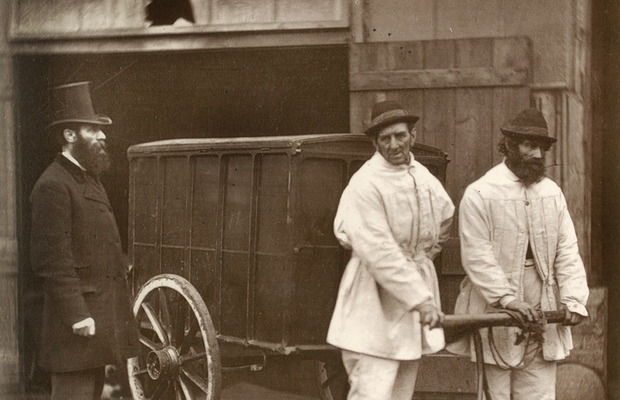William Wordsworth’s poem “Composed upon Westminster Bridge” and William Blake’s poem “London” offer two starkly different views of the city. Whereas Wordsworth’s poem seems to be bathed in light, soaking up the silence of a bright new day, Blake’s appears bogged down with the dreariness he sees around him. Each poem offers a different narrative of the city, and some of the key ideas I saw both of the authors using were visual cues with light and aural notes with the senses of sound, to communicate their visions of London.
As I previously mentioned, the stark contrasts of each of the poets’ usage of light is apparent. In Wordsworth’s poem, the shining promise of a new day is upon him, and it helps to illuminate the beauty he is surrounded by. Everything he describes around him is “bright and glittering in the smokeless air.” The calm that emerges because of this light fills Wordsworth with the joy he professes here, and he can then view the city with a more appreciative tone. Blake, however, contrasts Wordsworth in his descriptions of the city. While Wordsworth says the air is smokeless, Blake says the churches’ walls are blackened, and he notes how the chimney sweepers cry. Blake’s word choice, with words like “blackning” and “midnight” lend to a very dark image of London. Coupled with the melancholy imagery he uses when describing the individuals he sees, and the hopelessness inside of them, Blake’s view of London is a very depressing one, to say the least.
Wordsworth and Blake both use sound in their poems to convey their messages as well. The morning Wordsworth is discussing is described as silent and calming, to the point where even “the very houses seem asleep.” The only sound that is really conveyed in his poem is the sound of the river freely flowing, which is a calming sound. Blake’s poem, however, communicates a much more chaotic scene through his usage of sound. There are men crying, infants crying out of fear, and “youthful harlots” who are cursing. Each of them seems stuck in their melancholy viewpoints with no escape, and it makes it so that the scene is very unappealing. If it were quiet, at least Blake could be offered some calm to gather his thoughts. I think this is part of the reason why he focuses so much on the people in this poem: they are what he can make sense of, because they are being so loud.
The two representations of London are definitely apparent in these two poems, but they both speak to some of the same ideas in describing their surroundings. Wordsworth and Blake both mention the Thames – Wordsworth sees it as free flowing, Blake describes it as chartered. They also both mention places of worship in the poems (temples and churches, respectively). I think it’s interesting how different their representations of the city are, and how Wordsworth’s poem seems so full of hope, while Blake sees no escape. I wonder, too, if Wordsworth would consider Blake to be the dull man devoid of soul he describes in lines two and three, as Blake passes by the majesty. I’m intrigued by the slightly different historical periods they were written in, given that they were written eight years apart. I’d be interested to see how this history ties in to their shaping of their viewpoints.

Yes, such different poetic representations of the city! Perhaps it’s significant that Wordsworth is writing about a city that is still asleep, early in the morning, whereas Blake’s focus is on the overcrowded and busy city. Wordsworth would offer a very different representation of London in another poem that same year:
London, 1802
Milton! thou shouldst be living at this hour:
England hath need of thee: she is a fen
Of stagnant waters: altar, sword, and pen,
Fireside, the heroic wealth of hall and bower,
Have forfeited their ancient English dower
Of inward happiness. We are selfish men;
Oh! raise us up, return to us again;
And give us manners, virtue, freedom, power.
Thy soul was like a Star, and dwelt apart:
Thou hadst a voice whose sound was like the sea:
Pure as the naked heavens, majestic, free,
So didst thou travel on life’s common way,
In cheerful godliness; and yet thy heart
The lowliest duties on herself did lay.
“Composed upon Westminster Bridge” and “London” definitely illustrate polar opposite perspectives on the city. When reading the two poems, I could not help but notice how the two interpretations contrasted each other in terms of visual cues and overall theme. One reason for this variation could be is the different personal relationships Blake and Wordsworth had with London. Blake was living in London at the time, and his experiences of living there may have showed him more of the terrible standards than Wordsworth had experienced as a visitor. Wordsworth was not a London native, and he most likely was not as exposed to the cruel conditions as Blake. To a traveler at the time, London would have appeared majestic and scenic, while to someone who lived in the city longer, they would have a greater awareness of the injustices there. This is still the case in today’s world, and it is an important concept for travelers to keep in mind. Conditions are not always what they appear to be at first glance. It is also interesting to consider how these poetic interpretations of the same scene can change based upon the time of observation, as Dr. Gibson pointed out. This also speaks to the importance of perspective. The idea of opposing interpretations from visitors and natives expresses the stark difference perspective can play on understanding of the same location.